| |||||||||||||||||
| |||||||||||||||||
 County and independent city results Peery: 50–60% 60–70% 70–80% 80–90% >90% McWane: 50–60% | |||||||||||||||||
| |||||||||||||||||
The 1933 Virginia gubernatorial election was held on November 7, 1933, to elect the governor of Virginia.
| |||||||||||||||||
| |||||||||||||||||
 County and independent city results Peery: 50–60% 60–70% 70–80% 80–90% >90% McWane: 50–60% | |||||||||||||||||
| |||||||||||||||||
The 1933 Virginia gubernatorial election was held on November 7, 1933, to elect the governor of Virginia.
| Party | Candidate | Votes | % | |
|---|---|---|---|---|
| Democratic | George C. Peery | 122,820 | 73.74% | |
| Republican | Fred W. McWane | 40,377 | 24.24% | |
| Prohibition | Andrew J. Dunning | 1,112 | 0.67% | |
| Socialist | George C. White | 1,107 | 0.67% | |
| Independent | John Moffett Robinson | 877 | 0.53% | |
| Independent | W. A. Rowe | 274 | 0.16% | |
| Total votes | 166,567 | 100.00% | ||
| Democratic hold | ||||

Claude Augustus Swanson was an American lawyer and Democratic politician from Virginia. He served as U.S. Representative (1893–1906), Governor of Virginia (1906–1910), and U.S. Senator from Virginia (1910–1933), before becoming U.S. Secretary of the Navy under President Franklin D. Roosevelt from 1933 until his death. Swanson and fellow U.S. Senator Thomas Staples Martin led a Democratic political machine in Virginia for decades in the late 19th and early 20th century, which later became known as the Byrd Organization for Swanson's successor as U.S. Senator, Harry Flood Byrd.
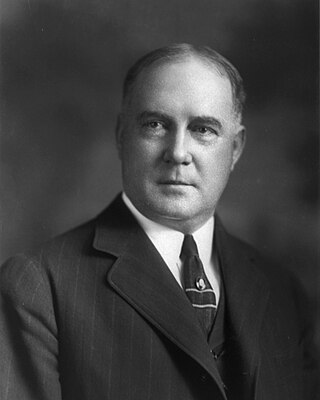
Andrew Jackson Montague was a Virginia lawyer and American politician. He served as the 44th governor of Virginia, from 1902 to 1906, and a Congressman from 1912 until his death in 1937. A Democrat, Montague was the first Virginia governor since the American Civil War not to have served in the Confederate military. Initially a Progressive, Governor Montague expanded the state capitol building, supported public education and the Good Roads Movement and opposed the Martin Organization. However, later as U.S. Congressman, he became a Conservative Democrat and supporter of the Byrd Organization.

Abner Linwood Holton Jr. was an American politician and attorney. He served as the 61st governor of Virginia, from 1970 to 1974, and was the first elected Republican governor of Virginia of the 20th century. He was known for supporting civil rights, integration, and public investment.
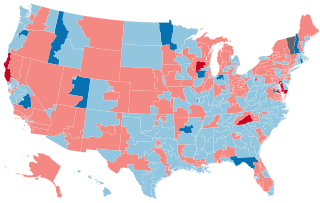
The 1990 United States House of Representatives elections was an election for the United States House of Representatives on November 6, 1990, to elect members to serve in the 102nd United States Congress. They occurred in the middle of President George H. W. Bush's term. As in most midterm elections, the President's Republican Party lost seats to the Democratic Party, slightly increasing the Democratic majority in the chamber. It was a rare instance, however, in which both major parties lost votes to third parties such as the Libertarian Party as well as independent candidates.

Colgate Whitehead Darden Jr. was an American lawyer and Democratic politician aligned with the Byrd Organization who served as U.S. Representative from Virginia, the 54th Governor of Virginia (1942–46), Chancellor of the College of William and Mary (1946–47), and the third President of the University of Virginia (1947–59). The Darden Graduate School of Business Administration of the University of Virginia is named for him.

The 2005 Virginia gubernatorial election was held on November 8, 2005 to elect the Governor of Virginia. The Democratic nominee, Lieutenant Governor Tim Kaine, the son-in-law to Linwood Holton, won the election. Virginia is the only state in the United States to prohibit governors from serving successive terms, meaning that the popular incumbent, Mark Warner, could not run for reelection.
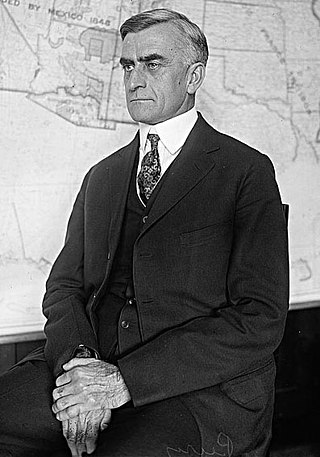
George Campbell Peery was an American Democratic politician, and was the 52nd governor of Virginia from 1934 to 1938. He became the second governor to be selected, at least partially, by the soon to be very powerful Byrd Organization, led by Senator Harry F. Byrd, Sr.

William "Extra Billy" Smith was a lawyer, congressman, the 30th and 35th Governor of Virginia, and a major general in the Confederate States Army during the American Civil War. On his appointment in January 1863, at 65, Smith was the oldest Confederate general to hold field command in the war.

Bourbon Democrat was a term used in the United States in the later 19th century and early 20th century (1872–1904) to refer to members of the Democratic Party who were ideologically aligned with fiscal conservatism or classical liberalism, especially those who supported presidential candidates Charles O'Conor in 1872, Samuel J. Tilden in 1876, President Grover Cleveland in 1884, 1888, and 1892 and Alton B. Parker in 1904.

James Hubert Price was an American politician who was elected 53rd Governor of Virginia in 1937, during the Great Depression and became known as the Commonwealth's "New Deal Governor." Over the opposition of the Byrd Organization, Price, a Virginia attorney and businessman, passed many social programs and implemented other federal programs to benefit Virginians. Price had previously represented Richmond as one of its delegates in the Virginia House of Delegates for over a decade (1916–1930), as well as served as Lieutenant Governor for two terms beginning in 1930.

Virginia's fourth congressional district is a United States congressional district in the state of Virginia, taking in most of the area between Richmond and the North Carolina state line. It covers all or part of the counties of Brunswick, Charles City, Chesterfield, Dinwiddie, Greensville, Henrico, Prince George, Southampton, Surry, and Sussex, and all or part of the independent cities of Colonial Heights, Emporia, Hopewell, Petersburg, and Richmond. The district is currently represented by Democrat Jennifer McClellan, who was elected to the seat after she defeated Republican Leon Benjamin in the February 21, 2023, special election, caused by the death of incumbent Donald McEachin (D) on November 28, 2022.
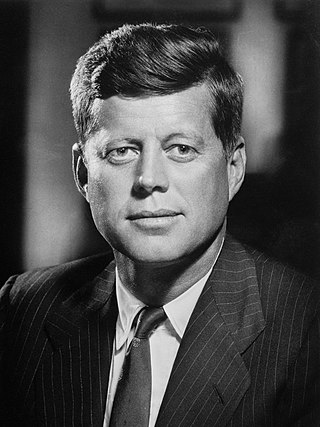
From March 8 to June 7, 1960, voters and members of the Democratic Party elected delegates to the 1960 Democratic National Convention through a series of caucuses, conventions, and primaries, partly for the purpose of nominating a candidate for President of the United States in the 1960 election. The presidential primaries were inconclusive, as several of the leading contenders did not enter them, but U.S. Senator John F. Kennedy of Massachusetts emerged as the strongest candidate and won the nomination over Lyndon B. Johnson at the convention, held from July 11 to 15 at the Los Angeles Memorial Sports Arena.

The 2012 United States Senate election in Virginia took place on November 6, 2012, concurrently with the 2012 U.S. presidential election as well as other elections to the United States Senate and House of Representatives and various state and local elections. Incumbent Democratic U.S. Senator Jim Webb retired instead of running for reelection to a second term, and former Democratic governor of Virginia Tim Kaine won the open seat over Republican former senator and governor George Allen. Kaine was unopposed for the Democratic nomination, and the Republicans nominated Allen through a primary on June 12, 2012. Allen had previously held this seat for one term before narrowly losing reelection to Webb in 2006.

In the 1969 Virginia gubernatorial election, incumbent Governor Mills E. Godwin, Jr., a Democrat, was unable to seek re-election due to term limits. A. Linwood Holton, Jr., an attorney from Roanoke, was nominated again by the Republican Party to run against former United States Ambassador to Australia, Democratic candidate William C. Battle.

The 1932 Arizona gubernatorial election took place on November 8, 1932. Incumbent Governor George W. P. Hunt ran for the Democratic nomination, but lost in the primary to Benjamin Baker Moeur, whose pre-gubernatorial experience included service as the Secretary of the Board of Education for Arizona State Teacher's College, which would later become Arizona State University.
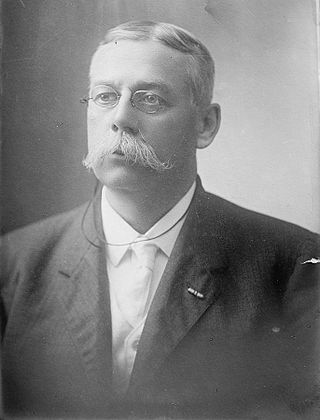
The 1890 Wyoming gubernatorial election was held on September 11, 1890, as the first gubernatorial election for the newly admitted state of Wyoming. Incumbent Territorial Governor Francis E. Warren ran for re-election as the Republican nominee against former Territorial Governor George W. Baxter, the Democratic nominee. Warren defeated Baxter by a decisive margin and became the first popularly elected Governor of Wyoming.
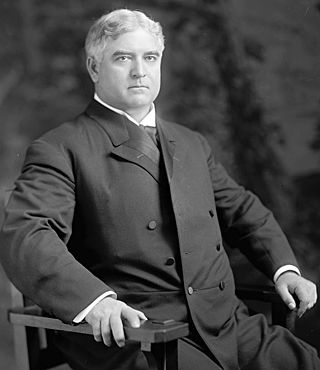
The 1908 Nebraska gubernatorial election was held on November 3, 1908.
| Elections in Virginia |
|---|
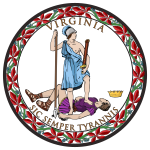 |